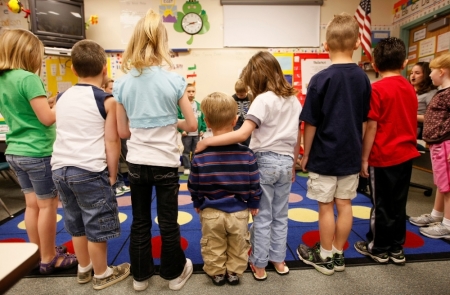Scientist Disputes Study Claiming Atheist Children More Charitable Than Religious Children

A scientist has denounced the merit of a recently released study that claims atheist children are more altruistic than religious children.
Earlier this month academic periodical Current Biology published a study that concluded that children raised in non-religious homes were more altruistic than ones raised in religious households.
Tom Trinko, a scientist with a Ph.D. in physics, penned a column for the conservative American Thinker denouncing the study as "pseudoscience."
A major issue Trinko has with the study is that it considers the term "non-religious" to be synonymous with "atheist."
"The study compares people who say they aren't religious with people who say they are. However, it turns out that when Pew surveyed Americans on their religions, 68 percent of those who identified as non-religious believed in God," argued Trinko.
Another major objection of the physicist was the researchers' use of "the dictator game," in which a person is given a fictional resource to hypothetically give to an unknown person, as the means to gather data.
"Because the children knew this was a game, for the [study's] conclusion to have any merit at all it must be true that everyone who is a cutthroat, no-stakes poker player, or in the case of children a highly competitive Chutes and Ladders player, must be lacking in real-life charity," continued Trinko.
On Nov. 5, Current Biology published online a paper by Jean Decety that claimed there was a negative association between religious upbringing and altruism.
From a sample population, the researchers surveyed 1,170 children aged 5-12 from the United States, Canada, Jordan, Turkey, South Africa, and China.
Of those surveyed, 510 were Muslim, 323 were non-religious, and 280 were Christian. According to Decety, the non-religious category was the most altruistic.
"Our findings robustly demonstrate that children from households identifying as either of the two major world religions (Christianity and Islam) were less altruistic than children from non-religious households," read the "Discussion" section of the study.
"Moreover, the negative relation between religiousness and spirituality and altruism changes across age, with those children with longer experience of religion in the household exhibiting the greatest negative relations."
Trinko is not the only critic of the study's findings. In a column for the conservative publication Breitbart, Thomas D. Williams countered the research with a 2000 study known as the Social Capital Community Benchmark Survey, which had a sample space of 30,000 Americans.
"Religious people are 25 percentage points more likely than secularists to donate money (91 percent versus 66 percent) and 23 points more likely to volunteer time (67 percent versus 44 percent)," wrote Williams regarding the 2000 Survey.
"In real dollars this translates into an average annual giving of $2,210 per person among the religious as compared to $642 among the secular."






















